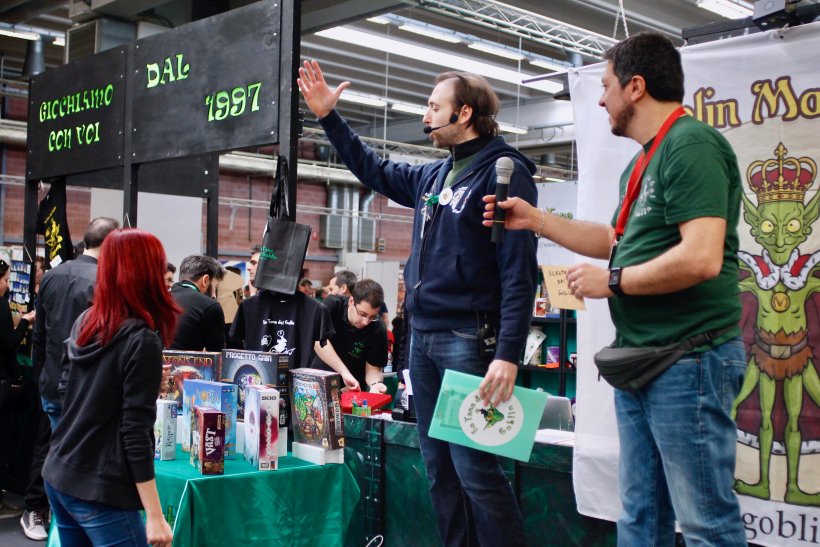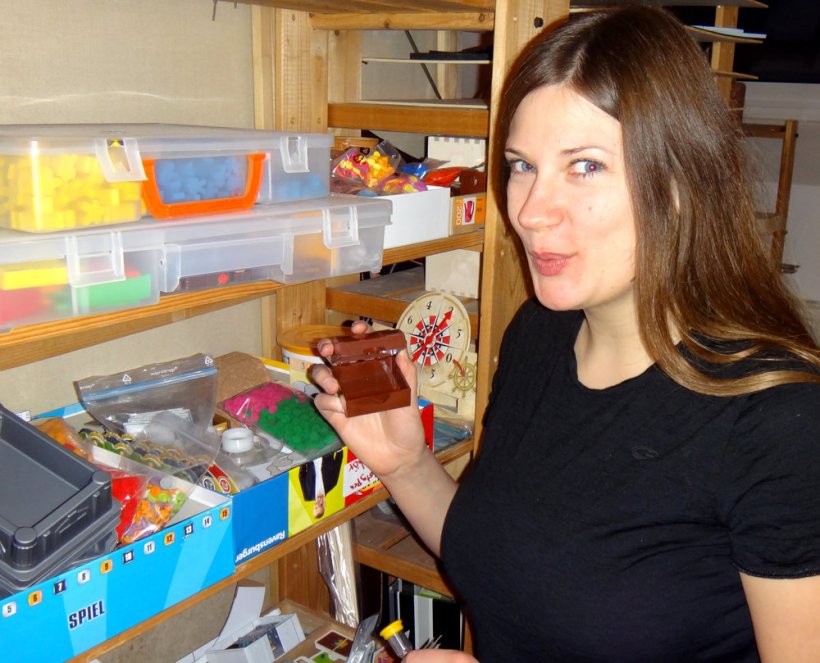Pet chiarezza , l'intervista è di Settembre, per questo non c'erano molte informazioni su The Bolthest
10 domande per Sophia Wagner
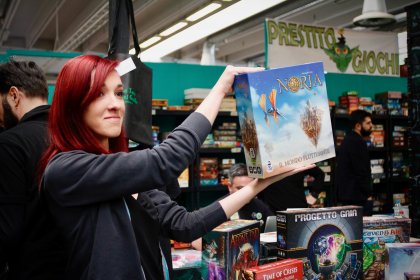
Mi piacciono tutti i tipi di giochi, dai party games agli strategici. I miei giochi preferiti ricreano un mondo dove puoi penetrare e tensione tra i partecipanti, come Battlestar Galactica. Mi piace Nome in Codice, Roll for the Galaxy, Meeple War e molti altri.
2) Questa è una delle tue prime esperienze come designer. Come hai scoperto il mondo dei boardgame e quando hai deciso di diventare un’autrice?
Da bambina giocavo tanto, ma poi ho smesso. Alla fine dei miei stuti in geologia ho conosciuto un gruppo di giocatori e mi sono subito innamorata dell’hobby! Una volta iniziato a giocare ho subito iniziato ad inventare giochi. È stata una cosa naturale. Dopo aver progettato i miei primi tre giochi ho iniziato a contattare altri autori e ho scoperto un mondo fatto di fiere e di opportunità per tenersi in contatto.
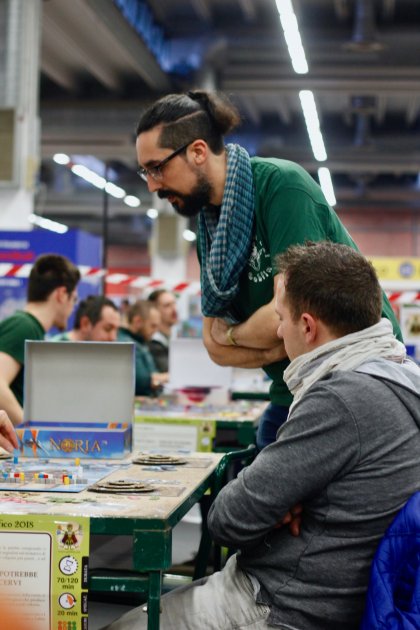
Ci sono tanti giochi basati su insalata di punti, anche bei giochi, ma io volevo realizzare qualcosa di diverso. Sento che c’è molta tensione tra i giocatori quando si gioca a Noria. Mi piace l’interazione che è generata dalla modalità con cui si fanno punti. In definitiva mi piace Noria! Specialmente per le rondelle e i tracciati politici, ovviamente.
4) Le ruote sono l’icona di Noria. Come hai sviluppato questa idea?
Ho iniziato a sviluppare giochi con ruote che girano prima ancora di Noria. All’epoca ero più concentrata sui giochi tematici, di tipo ameritrasher. Poi l’editore di Noria, Edition Spielwise, chiedeva un eurogame. Così ho combinato le ruote con un eurogame ed è venuto fuori Noria.
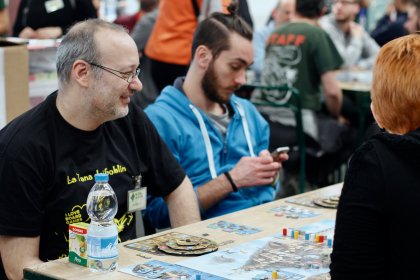
Penso che la strategia principale consista nel prendere in considerazione le azioni dei tuoi avversari nelle scelte che fai. Ed è così che gioco: muovo i cilindri quando penso sia vantaggioso per me più che per gli altri. Quando vedo che qualcuno segue un determinato piano devo prendere una decisione: salto sullo stesso tracciato, o investo in un altro percorso? Sono queste scelte che mi fanno piacere Noria e che rendono ogni partita un po’ diversa.
6) Un possibile problema a lungo termine è che emerga una strategia dominante: hai trovato delle configurazioni ottimali nei tuoi playtest, o ce ne sono svariate?
Noria ti spinge a cambiare la configurazione della rondella nel corso della partita, ma ci sono savariati approcci possibili. Anche questo dipende dalle scelte degli avversari e da quanta Conoscenza hai a disposizione per modificare la ruota.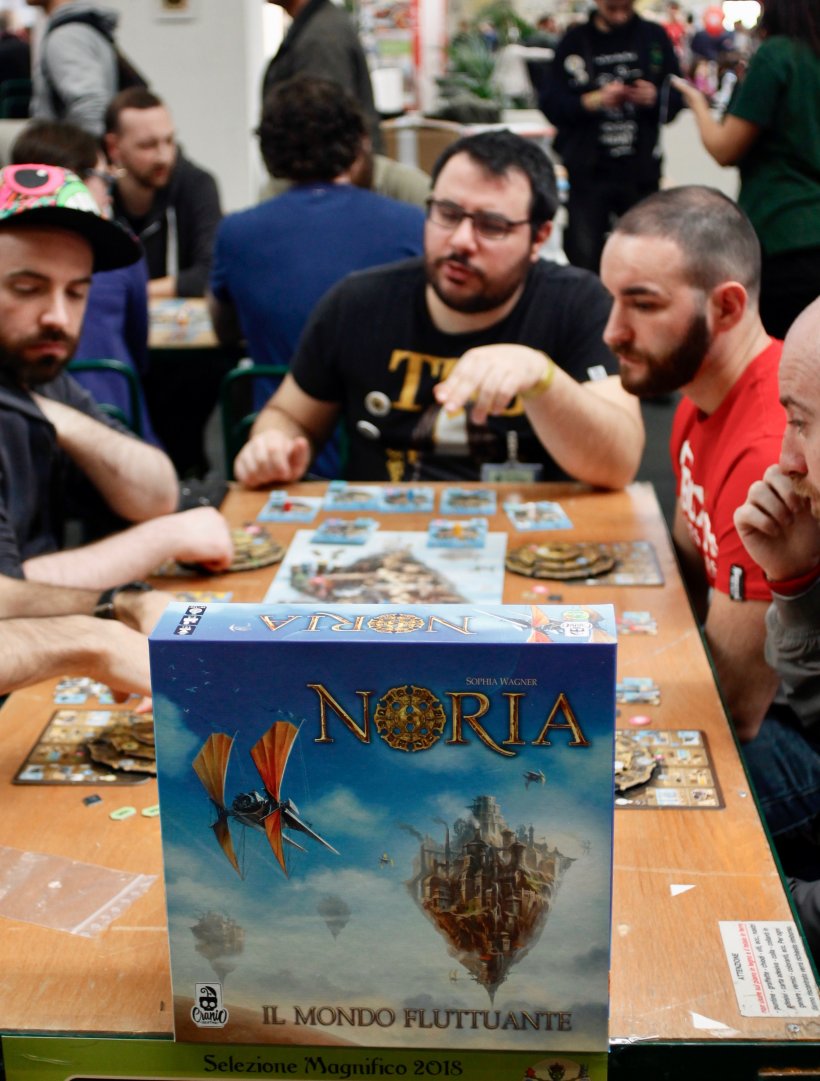
7) Qualcuno sostiene che il meccanismo simil-azionario dei cubi politici può congelare il gioco nei turni iniziali se tutti spendono immediatamente la Conoscenza a disposizione. Ci trovi un buon motivo per agire così? Lo hai visto fare durante i playtest?
Il gioco è strutturato con le azioni politiche economiche all’inizio e più costose con il progredire della partita. Hai provato, durante i playtest, ad invertire il trend: economica alla fine e costosa all’inizio?
Ci sono giocatori che utilizzano la Conoscenza nei primi turni, ma questo non congela il gioco.
Per i prezzi, ho provato approcci diversi, ma alla fine questo è il risultato migliore. E non è propriamente corretto dire che le azioni politiche sono economiche all’inizio e costose alla fine, man mano che la tua rendita aumenta nel corso della partita potrà sembrarti esattamente il contrario, dipende da quante fabbriche costruisci.
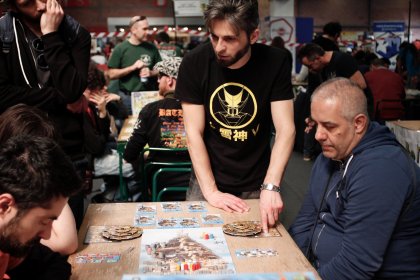
Di sicuro ci sono risvolti negativi, ma nel complesso, a mio parere, gli aspetti positivi superano i negativi. Specialmente, realizzare giochi con un approccio diverso, come il legacy, penso sia una grande cosa!
Ma anche Kickstarter offre l’opportunità di portare una ventata di freschezza nel mondo dei boardgame.
9) Hai giocato gli altri sette selezionati del nostro premio? Cosa ne pensi?
Mi spiace, ma preferisco non scrivere riguardo ad altri autori. Dico solo che ci sono dei bei giochi e che mi sento onorata per il fatto che ci sia Noria.
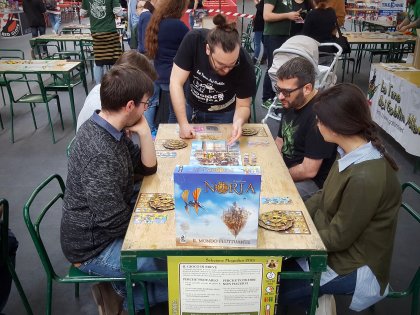
Il mio nuovo gioco, The Boldest, è in uscita per Essen quest’anno; è assai diverso da Noria, ma mi piace tanto. È tutto basato sull’interazione tra i giocatori, il saccheggio e le tattiche a breve termine, che potrebbero funzionare o essere superate dagli avversari. The Boldest introduce anche un'interessante modalità di giocare le carte per eseguire azioni… ma mi riprometto di non parlarne troppo, fin quando non lo farà l’editore, Edition Spielwise. Se siete interessati, seguitelo su BoardGameGeek, sono sicuro che presto ci saranno più informazioni! Sono molto entusiasta dell'uscita ad Essen, spero che vi piaccia tanto quanto me!
Intervista originale in Inglese
1) Tell us something about you: what kind of player are you? Tell us your favourite games (not made by you).
I like almost all kind of games, from party games to strategy games. My favorite games create a world that we can enter and a tension between the players, like the board game Battlestar Galactica. I love Codenames, Roll for the Galaxy, Meeple War and many others.
2) This is one of your first experience as game designer. How did you discover the world of board gaming and when did you decide to become a designer?
As a kid, I was playing a lot, but lost the focus on it. At the end of my studies of geosciences I met a group of boardgamers and immediately fell in love for the hobby! Starting to play games, I also started to invent games. It just happened. After inventing my first 3 games, I started to search for other board game designers and discovered a whole world of fairs and opportunities to get in contact.
3) Noria is a very dry, essential game. You have only one way to make victory points: no bonuses, no combos, etc. Do you like this kind of games, where you have to focus only in one direction? (even if you have multiple ways to reach it).
There are a lot of point salad games, also good games, but I wanted to go another way. I have the feeling, that the tension between players is very high in Noria. Also, I like the interaction that is triggered by this kind of mechanic to get victory points. So yes, I like Noria! Especially the politics track and the wheels, of course.
4) The wheels are the iconic mechanic of Noria. How did you develop this idea?
I started designing games with rotatable rings long before I started Noria. At that time, I was working more on thematic games or ameritrash games. The publisher of Noria, Edition Spielwiese, wanted a eurogame. So I combined the rings and the eurogame and the Wheelbuilding of Noria was born.
5) I think there are two main strategies in Noria: let every Rapresentative cylinder climb few steps of every ladder, using the path of the low cylinder, or let one/two Rapresentative climb a loto of steps, using the path of the high cylinder. Do you agree with this and how do you usually play?
I think, the main strategy is, to include the actions of the other players in your considerations. And that is how I play, I move the representatives when I think it is a bigger gain for me than for others. If I see, someone is following a certain plan, I have to decide, will I jump on the ladder he already made worthy or will I invest in an other ladder myself. Those decisions are what I like about Noria and which make every game a bit different.
6) One long term problem with the wheel is a possible emerging strategy: did you find some optimal configuration in your playtests, or are there more than one?
Noria encourages to change the wheel during the game, but there are different promising ways to do it. Also here, a lot is dependent on other players, also on how much knowledge you can spend to manipulate the wheel.
7) Someone says the shares-like politician cubes system could freeze the game in the initial turns, if everyone spend immediately their Knowledge tokens. Did you find any reason or any player doing this thing in your playtests?
There are players, using their knowledge in the first turn, but the game doesn’t freeze that way.
7b) And moreover, now using political cubes is cheap at the beginning of the game and expensive at the end, have you ever tried in your playtest to invert the trend: cheap at the end, expensive at beginning?
Yes, I tried different pricing, but in the end, this was the best. Also, the political cubes aren’t really cheap at the beginning and expensive at the end. As your income of knowledge increases during the game, it could feel just the other way around, depending on how many factories you built.
8 ) Kickstarter, Legacy System, SmartPhones' Apps. Three things that seem invading and changing the world of boardgaming. Do you have a positive or negative opinion about each of them?
Of course, there are some negative things to say, but for me the positive side outweighs the negative side. Especially, making boardgames more interesting by new approaches like Legacy is a great thing! But also, Kickstarter offers great opportunities to bring fresh air into the gaming world.
9) Did you play the other seven games in the selection? What do you think about them?
Sorry, I don´t want to write what I think about other designers games...let´s just say, there are some quite good ones in the list! I feel honored, that Noria is one of them!
10) What new games are you working on? Tell us something about your future projects
My new game "The Boldest" will be released at Essen this year! It is very different to Noria, but I really love it. It´s a lot about player interaction, loot and short term tactics, that might work out as a great plan or be crossed by other players. "The Boldest" also introduces a nice way of using your cards to do actions...but I promised not to tell to much until the publisher, Edition Spielwiese, will do so. If you are interested, please follow it on BoardGameGeek, I am sure, more information will be out, soon! I am very excited about the release in Essen, I hope you like it, as much as I do!
